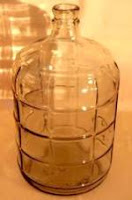 BlueStem Winery (in addition to being a licensed winery) operates a full-service beer brewing and home winemaking supply store in Parkersburg, Iowa and on the web. Every once in awhile I have a home brewing or winemaking customer ask about using plastic carboys (the glass jug used as a secondary fermenter for making home brew beer or for wine making at home). Some brewers also use a larger carboy as a primary fermenter.
BlueStem Winery (in addition to being a licensed winery) operates a full-service beer brewing and home winemaking supply store in Parkersburg, Iowa and on the web. Every once in awhile I have a home brewing or winemaking customer ask about using plastic carboys (the glass jug used as a secondary fermenter for making home brew beer or for wine making at home). Some brewers also use a larger carboy as a primary fermenter.Although I never say never, at the present time BlueStem Winery does not sell nor do we recommend the use of plastic carboys as a secondary fermentation vessel for either wine making or for homebrew beer.
Both types of carboys have inherent advantages and disadvantages but in our opinion the advantages of glass outweigh the advantages offered by the plastic carboy and the disadvantages of plastic outweigh the disadvantages of glass carboys.
Glass carboys have a few very obvious disadvantages. The number one concern regarding this piece of wine making and beer brewing equipment is its weight. The glass carboys simply weigh quite a bit more than the plastic ones. The obvious disadvantage of glass is that it will break (shatter would be a better word and this comes from experience!). Obviously, both of these disadvantages of the glass carboys are advantages for the plastic version.
Another advantage touted about the plastic carboys is that they are cheaper to purchase than plastic. I tend to agree (partially) with this statement. The carboys themselves are cheaper but they also require quite a bit of peripheral equipment that dollars up fairly fast.
Glass carboys offer the following advantages over plastic:
1. Glass is easier to clean and sanitize than plastic and will not scratch when cleaned (every scratch is a potential hiding place for bacteria);
2. It is easier with glass to get a good seal between the carboy and an airlock. Bad seals equal potentially bad wine (it is called oxidation but it tastes like vinegar);
3. Glass is not capable of transferring a chemical or solvent from within the glass itself. Plastic can possibly leach solvents (and bad flavors) from its own chemical composition into the wine;
4. Plastics are not immune to the passage of air through the very plastic itself. Although this is probably of very little consequence during a brief fermentation period it can have negative effects during long term storage. In this sense, plastic would be more viable as a secondary fermentation vessel used for beer (where secondary fermentation is a short period of time) as compared to the secondary fermentation of wine.
Looking for a reliable source for purchasing your beer ingredients or your wine kits? BlueStem Winery is a great place to purchase your home beer brewing equipment, supplies and ingredients. We also stock a great line of winemaking ingredients, supplies and equipment plus a super lineup of both Cellar Craft and WinExpert wine kits.



No comments:
Post a Comment